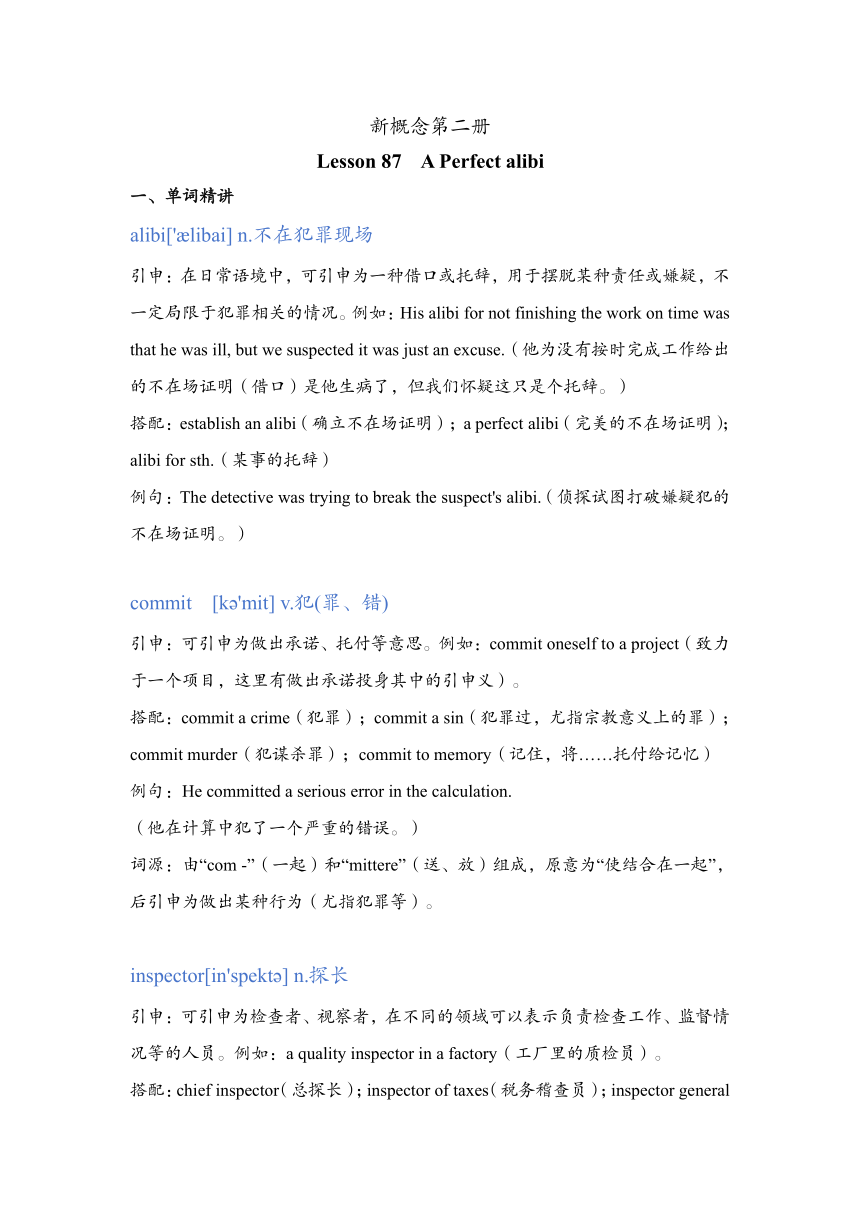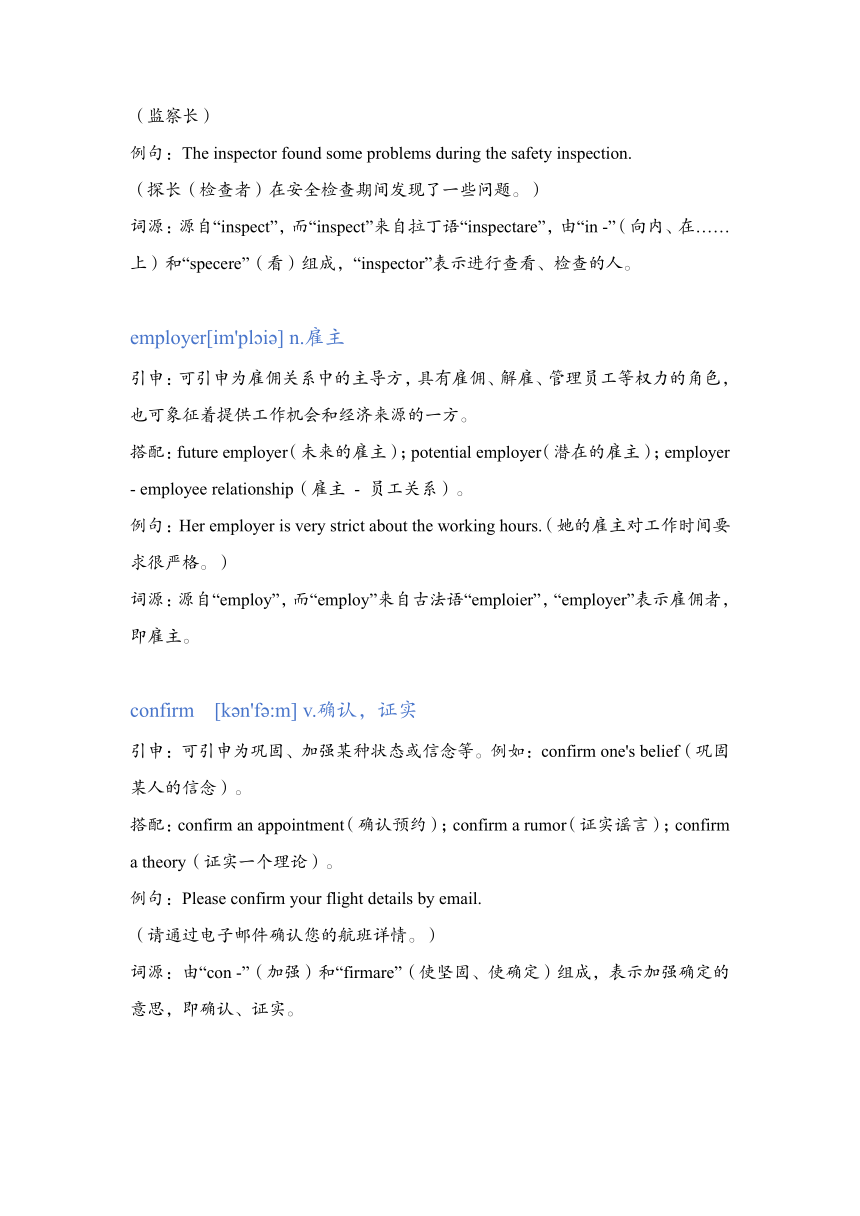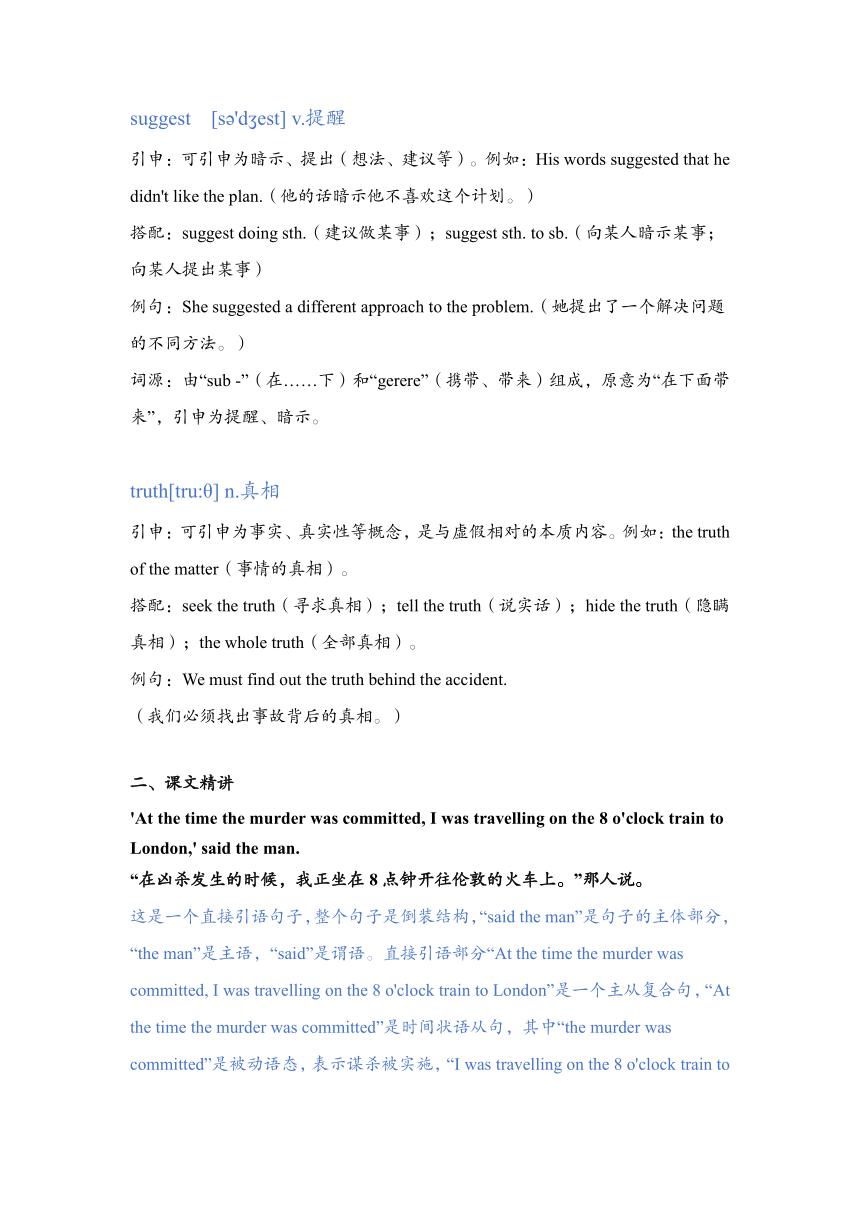新概念第二册Lesson 87 A Perfect alibi讲义
文档属性
| 名称 | 新概念第二册Lesson 87 A Perfect alibi讲义 |  | |
| 格式 | docx | ||
| 文件大小 | 126.6KB | ||
| 资源类型 | 教案 | ||
| 版本资源 | 新概念英语 | ||
| 科目 | 英语 | ||
| 更新时间 | 2024-11-25 19:41:37 | ||
图片预览



文档简介
新概念第二册
Lesson 87 A Perfect alibi
单词精讲
alibi[' libai] n.不在犯罪现场
引申:在日常语境中,可引申为一种借口或托辞,用于摆脱某种责任或嫌疑,不一定局限于犯罪相关的情况。例如:His alibi for not finishing the work on time was that he was ill, but we suspected it was just an excuse.(他为没有按时完成工作给出的不在场证明(借口)是他生病了,但我们怀疑这只是个托辞。)
搭配:establish an alibi(确立不在场证明);a perfect alibi(完美的不在场证明);alibi for sth.(某事的托辞)
例句:The detective was trying to break the suspect's alibi.(侦探试图打破嫌疑犯的不在场证明。)
commit [k 'mit] v.犯(罪、错)
引申:可引申为做出承诺、托付等意思。例如:commit oneself to a project(致力于一个项目,这里有做出承诺投身其中的引申义)。
搭配:commit a crime(犯罪);commit a sin(犯罪过,尤指宗教意义上的罪);commit murder(犯谋杀罪);commit to memory(记住,将……托付给记忆)
例句:He committed a serious error in the calculation.
(他在计算中犯了一个严重的错误。)
词源:由“com -”(一起)和“mittere”(送、放)组成,原意为“使结合在一起”,后引申为做出某种行为(尤指犯罪等)。
inspector[in'spekt ] n.探长
引申:可引申为检查者、视察者,在不同的领域可以表示负责检查工作、监督情况等的人员。例如:a quality inspector in a factory(工厂里的质检员)。
搭配:chief inspector(总探长);inspector of taxes(税务稽查员);inspector general(监察长)
例句:The inspector found some problems during the safety inspection.
(探长(检查者)在安全检查期间发现了一些问题。)
词源:源自“inspect”,而“inspect”来自拉丁语“inspectare”,由“in -”(向内、在……上)和“specere”(看)组成,“inspector”表示进行查看、检查的人。
employer[im'pl i ] n.雇主
引申:可引申为雇佣关系中的主导方,具有雇佣、解雇、管理员工等权力的角色,也可象征着提供工作机会和经济来源的一方。
搭配:future employer(未来的雇主);potential employer(潜在的雇主);employer - employee relationship(雇主 - 员工关系)。
例句:Her employer is very strict about the working hours.(她的雇主对工作时间要求很严格。)
词源:源自“employ”,而“employ”来自古法语“emploier”,“employer”表示雇佣者,即雇主。
confirm [k n'f :m] v.确认,证实
引申:可引申为巩固、加强某种状态或信念等。例如:confirm one's belief(巩固某人的信念)。
搭配:confirm an appointment(确认预约);confirm a rumor(证实谣言);confirm a theory(证实一个理论)。
例句:Please confirm your flight details by email.
(请通过电子邮件确认您的航班详情。)
词源:由“con -”(加强)和“firmare”(使坚固、使确定)组成,表示加强确定的意思,即确认、证实。
suggest [s 'd est] v.提醒
引申:可引申为暗示、提出(想法、建议等)。例如:His words suggested that he didn't like the plan.(他的话暗示他不喜欢这个计划。)
搭配:suggest doing sth.(建议做某事);suggest sth. to sb.(向某人暗示某事;向某人提出某事)
例句:She suggested a different approach to the problem.(她提出了一个解决问题的不同方法。)
词源:由“sub -”(在……下)和“gerere”(携带、带来)组成,原意为“在下面带来”,引申为提醒、暗示。
truth[tru:θ] n.真相
引申:可引申为事实、真实性等概念,是与虚假相对的本质内容。例如:the truth of the matter(事情的真相)。
搭配:seek the truth(寻求真相);tell the truth(说实话);hide the truth(隐瞒真相);the whole truth(全部真相)。
例句:We must find out the truth behind the accident.
(我们必须找出事故背后的真相。)
课文精讲
'At the time the murder was committed, I was travelling on the 8 o'clock train to London,' said the man.
“在凶杀发生的时候,我正坐在8点钟开往伦敦的火车上。”那人说。
这是一个直接引语句子,整个句子是倒装结构,“said the man”是句子的主体部分,“the man”是主语,“said”是谓语。直接引语部分“At the time the murder was committed, I was travelling on the 8 o'clock train to London”是一个主从复合句,“At the time the murder was committed”是时间状语从句,其中“the murder was committed”是被动语态,表示谋杀被实施,“I was travelling on the 8 o'clock train to London”是主句,“I”是主语,“was travelling”是过去进行时,表示过去某个时间正在进行的动作,“on the 8 o'clock train to London”是介词短语作状语,表示方式和目的地。
“commit”在这里是“犯(罪)”的意思,“travel on a train”表示乘坐火车旅行。
'Do you always catch such an early train ' asked the inspector.
“您总是赶这样早的火车?”探长问。
这是一个直接引语句子,也是倒装结构,“asked the inspector”是句子的主体部分,“the inspector”是主语,“asked”是谓语。直接引语部分“Do you always catch such an early train ”是一般疑问句,“you”是主语,“catch”是谓语,“such an early train”是宾语,“always”是副词作状语,表示频率。
“catch a train”表示赶火车。
'Of course I do,' answered the man. 'I must be at work at 10 o'clock. My employer will confirm that I was there on time.'
“当然是的,”那人回答。“我必须在10点钟上班,我的雇主会证明我是按时到了那儿的。”
这部分包含两个句子。第一个句子“Of course I do,”是对前面问题的回答,“I”是主语,“do”指代前面的“catch such an early train”。“answered the man”是句子的补充说明部分,“the man”是主语,“answered”是谓语。第二个句子“I must be at work at 10 o'clock. My employer will confirm that I was there on time.”是一个主从复合句,“I must be at work at 10 o'clock”是主句,“I”是主语,“must be”是情态动词加系动词结构,表示必须处于某种状态,“at work”是介词短语作表语,“at 10 o'clock”是时间状语。“My employer will confirm that I was there on time”中,“My employer”是主语,“will confirm”是谓语,“that I was there on time”是宾语从句,“I”是从句主语,“was there”是系表结构,“on time”是时间状语。
“be at work”表示在工作,“confirm”表示确认。
'Would a later train get you to work on time ' asked the inspector.
“晚一点儿的车也能送您按时上班吗?”
这是一个直接引语句子,倒装结构,“asked the inspector”是句子的主体部分,“the inspector”是主语,“asked”是谓语。直接引语部分“Would a later train get you to work on time ”是一般疑问句,“a later train”是主语,“get you to work”是使役结构,表示使某人到达工作地点,“on time”是时间状语。
“get sb. to...”表示使某人到达某地。
'At what time did you arrive at the station '“您几点钟到的火车站?
这是一个特殊疑问句,“At what time”是疑问词组作时间状语,“did you arrive at the station ”中“you”是主语,“arrive at”是谓语,“the station”是宾语。
“arrive at”表示到达(小地点,如车站等)
'At ten to eight. I bought a paper and waited for the train.'
“7点50分。我买了张报纸,等着车来。”
这部分包含两个句子。第一个句子“At ten to eight”是简单的时间状语,补充回答前面的问题。第二个句子“I bought a paper and waited for the train”是并列句,“I”是主语,“bought a paper”和“waited for the train”是并列谓语,“a paper”是“bought”的宾语,“for the train”是“waited”的目的状语。
“buy a paper”这里的“paper”可能指报纸,“wait for”表示等待。
And you didn't notice anything unusual
“您没有注意到有什么异常情况发生吗?”
这是一个陈述疑问句,如:
You’re out of work
不定代词anything,something等被形容词修饰时,形容词必须跟在不定代词之后:
This isn’t anything important.
I’d like something cheaper.
I suggest,' said the inspector, 'that you are not telling the truth.
I suggest (that)… 依我看……,恐怕……
I suggest that he is not so honest as he looks.
I suggest that the car crash was not accidental.
'Of course not.'“当然没有。”
这是一个省略句,完整形式可能是“I did not notice anything unusual, of course.”,“of course”是插入语。
'I suggest,' said the inspector, 'that you are not telling the truth. I suggest that you did not catch the 8 o'clock train, but that you caught the 8.25 which would still get you to work on time. You see, on the morning of the murder, the 8 o'clock train did not run at all. It broke down at Ferngreen station and was taken off the line.'
“我提醒您,”探长说,“您讲的不是实话。您乘的不是8点钟的火车,而是8点25分的,这次车同样能使您按时上班。您看,在凶杀发生的那天早晨,8点钟的那次车根本没有发。它在芬格林车站出了故障而被取消了。”
you see在口语中经常作为插入语出现,句首、句中或句尾均可以,表示“你知道,事实上”等含义:
He was not really interested in film, you see.
My leg isn’t all right yet, you see, so I can’t climb the hill with you.
run可以指火车、公共汽车、船等“定时/定期行驶,(在两地间)往来”:
This ship runs between Dover and Calais.
“suggest”在这里表示暗示、认为,“break down”表示出故障,“take off the line”表示从线路上移除。
Lesson 87 A Perfect alibi
单词精讲
alibi[' libai] n.不在犯罪现场
引申:在日常语境中,可引申为一种借口或托辞,用于摆脱某种责任或嫌疑,不一定局限于犯罪相关的情况。例如:His alibi for not finishing the work on time was that he was ill, but we suspected it was just an excuse.(他为没有按时完成工作给出的不在场证明(借口)是他生病了,但我们怀疑这只是个托辞。)
搭配:establish an alibi(确立不在场证明);a perfect alibi(完美的不在场证明);alibi for sth.(某事的托辞)
例句:The detective was trying to break the suspect's alibi.(侦探试图打破嫌疑犯的不在场证明。)
commit [k 'mit] v.犯(罪、错)
引申:可引申为做出承诺、托付等意思。例如:commit oneself to a project(致力于一个项目,这里有做出承诺投身其中的引申义)。
搭配:commit a crime(犯罪);commit a sin(犯罪过,尤指宗教意义上的罪);commit murder(犯谋杀罪);commit to memory(记住,将……托付给记忆)
例句:He committed a serious error in the calculation.
(他在计算中犯了一个严重的错误。)
词源:由“com -”(一起)和“mittere”(送、放)组成,原意为“使结合在一起”,后引申为做出某种行为(尤指犯罪等)。
inspector[in'spekt ] n.探长
引申:可引申为检查者、视察者,在不同的领域可以表示负责检查工作、监督情况等的人员。例如:a quality inspector in a factory(工厂里的质检员)。
搭配:chief inspector(总探长);inspector of taxes(税务稽查员);inspector general(监察长)
例句:The inspector found some problems during the safety inspection.
(探长(检查者)在安全检查期间发现了一些问题。)
词源:源自“inspect”,而“inspect”来自拉丁语“inspectare”,由“in -”(向内、在……上)和“specere”(看)组成,“inspector”表示进行查看、检查的人。
employer[im'pl i ] n.雇主
引申:可引申为雇佣关系中的主导方,具有雇佣、解雇、管理员工等权力的角色,也可象征着提供工作机会和经济来源的一方。
搭配:future employer(未来的雇主);potential employer(潜在的雇主);employer - employee relationship(雇主 - 员工关系)。
例句:Her employer is very strict about the working hours.(她的雇主对工作时间要求很严格。)
词源:源自“employ”,而“employ”来自古法语“emploier”,“employer”表示雇佣者,即雇主。
confirm [k n'f :m] v.确认,证实
引申:可引申为巩固、加强某种状态或信念等。例如:confirm one's belief(巩固某人的信念)。
搭配:confirm an appointment(确认预约);confirm a rumor(证实谣言);confirm a theory(证实一个理论)。
例句:Please confirm your flight details by email.
(请通过电子邮件确认您的航班详情。)
词源:由“con -”(加强)和“firmare”(使坚固、使确定)组成,表示加强确定的意思,即确认、证实。
suggest [s 'd est] v.提醒
引申:可引申为暗示、提出(想法、建议等)。例如:His words suggested that he didn't like the plan.(他的话暗示他不喜欢这个计划。)
搭配:suggest doing sth.(建议做某事);suggest sth. to sb.(向某人暗示某事;向某人提出某事)
例句:She suggested a different approach to the problem.(她提出了一个解决问题的不同方法。)
词源:由“sub -”(在……下)和“gerere”(携带、带来)组成,原意为“在下面带来”,引申为提醒、暗示。
truth[tru:θ] n.真相
引申:可引申为事实、真实性等概念,是与虚假相对的本质内容。例如:the truth of the matter(事情的真相)。
搭配:seek the truth(寻求真相);tell the truth(说实话);hide the truth(隐瞒真相);the whole truth(全部真相)。
例句:We must find out the truth behind the accident.
(我们必须找出事故背后的真相。)
课文精讲
'At the time the murder was committed, I was travelling on the 8 o'clock train to London,' said the man.
“在凶杀发生的时候,我正坐在8点钟开往伦敦的火车上。”那人说。
这是一个直接引语句子,整个句子是倒装结构,“said the man”是句子的主体部分,“the man”是主语,“said”是谓语。直接引语部分“At the time the murder was committed, I was travelling on the 8 o'clock train to London”是一个主从复合句,“At the time the murder was committed”是时间状语从句,其中“the murder was committed”是被动语态,表示谋杀被实施,“I was travelling on the 8 o'clock train to London”是主句,“I”是主语,“was travelling”是过去进行时,表示过去某个时间正在进行的动作,“on the 8 o'clock train to London”是介词短语作状语,表示方式和目的地。
“commit”在这里是“犯(罪)”的意思,“travel on a train”表示乘坐火车旅行。
'Do you always catch such an early train ' asked the inspector.
“您总是赶这样早的火车?”探长问。
这是一个直接引语句子,也是倒装结构,“asked the inspector”是句子的主体部分,“the inspector”是主语,“asked”是谓语。直接引语部分“Do you always catch such an early train ”是一般疑问句,“you”是主语,“catch”是谓语,“such an early train”是宾语,“always”是副词作状语,表示频率。
“catch a train”表示赶火车。
'Of course I do,' answered the man. 'I must be at work at 10 o'clock. My employer will confirm that I was there on time.'
“当然是的,”那人回答。“我必须在10点钟上班,我的雇主会证明我是按时到了那儿的。”
这部分包含两个句子。第一个句子“Of course I do,”是对前面问题的回答,“I”是主语,“do”指代前面的“catch such an early train”。“answered the man”是句子的补充说明部分,“the man”是主语,“answered”是谓语。第二个句子“I must be at work at 10 o'clock. My employer will confirm that I was there on time.”是一个主从复合句,“I must be at work at 10 o'clock”是主句,“I”是主语,“must be”是情态动词加系动词结构,表示必须处于某种状态,“at work”是介词短语作表语,“at 10 o'clock”是时间状语。“My employer will confirm that I was there on time”中,“My employer”是主语,“will confirm”是谓语,“that I was there on time”是宾语从句,“I”是从句主语,“was there”是系表结构,“on time”是时间状语。
“be at work”表示在工作,“confirm”表示确认。
'Would a later train get you to work on time ' asked the inspector.
“晚一点儿的车也能送您按时上班吗?”
这是一个直接引语句子,倒装结构,“asked the inspector”是句子的主体部分,“the inspector”是主语,“asked”是谓语。直接引语部分“Would a later train get you to work on time ”是一般疑问句,“a later train”是主语,“get you to work”是使役结构,表示使某人到达工作地点,“on time”是时间状语。
“get sb. to...”表示使某人到达某地。
'At what time did you arrive at the station '“您几点钟到的火车站?
这是一个特殊疑问句,“At what time”是疑问词组作时间状语,“did you arrive at the station ”中“you”是主语,“arrive at”是谓语,“the station”是宾语。
“arrive at”表示到达(小地点,如车站等)
'At ten to eight. I bought a paper and waited for the train.'
“7点50分。我买了张报纸,等着车来。”
这部分包含两个句子。第一个句子“At ten to eight”是简单的时间状语,补充回答前面的问题。第二个句子“I bought a paper and waited for the train”是并列句,“I”是主语,“bought a paper”和“waited for the train”是并列谓语,“a paper”是“bought”的宾语,“for the train”是“waited”的目的状语。
“buy a paper”这里的“paper”可能指报纸,“wait for”表示等待。
And you didn't notice anything unusual
“您没有注意到有什么异常情况发生吗?”
这是一个陈述疑问句,如:
You’re out of work
不定代词anything,something等被形容词修饰时,形容词必须跟在不定代词之后:
This isn’t anything important.
I’d like something cheaper.
I suggest,' said the inspector, 'that you are not telling the truth.
I suggest (that)… 依我看……,恐怕……
I suggest that he is not so honest as he looks.
I suggest that the car crash was not accidental.
'Of course not.'“当然没有。”
这是一个省略句,完整形式可能是“I did not notice anything unusual, of course.”,“of course”是插入语。
'I suggest,' said the inspector, 'that you are not telling the truth. I suggest that you did not catch the 8 o'clock train, but that you caught the 8.25 which would still get you to work on time. You see, on the morning of the murder, the 8 o'clock train did not run at all. It broke down at Ferngreen station and was taken off the line.'
“我提醒您,”探长说,“您讲的不是实话。您乘的不是8点钟的火车,而是8点25分的,这次车同样能使您按时上班。您看,在凶杀发生的那天早晨,8点钟的那次车根本没有发。它在芬格林车站出了故障而被取消了。”
you see在口语中经常作为插入语出现,句首、句中或句尾均可以,表示“你知道,事实上”等含义:
He was not really interested in film, you see.
My leg isn’t all right yet, you see, so I can’t climb the hill with you.
run可以指火车、公共汽车、船等“定时/定期行驶,(在两地间)往来”:
This ship runs between Dover and Calais.
“suggest”在这里表示暗示、认为,“break down”表示出故障,“take off the line”表示从线路上移除。
同课章节目录
